Презентация past tenses

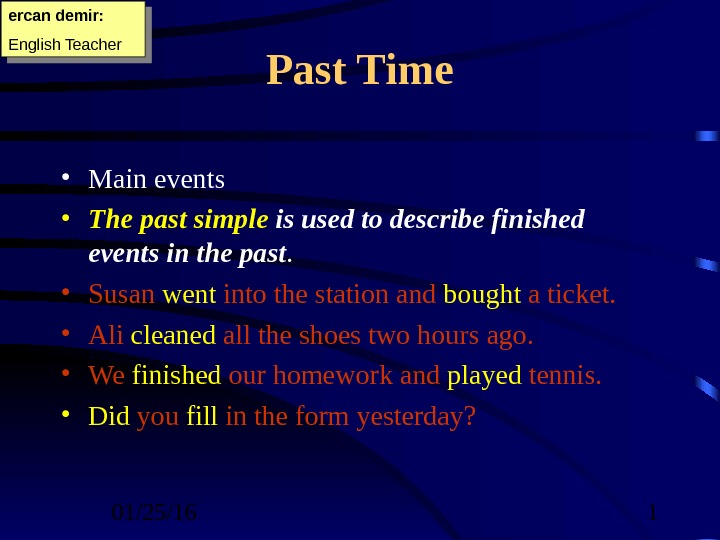
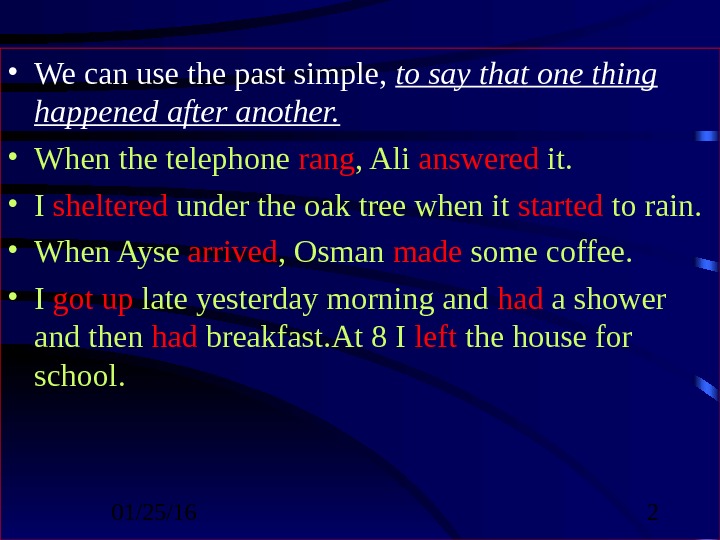
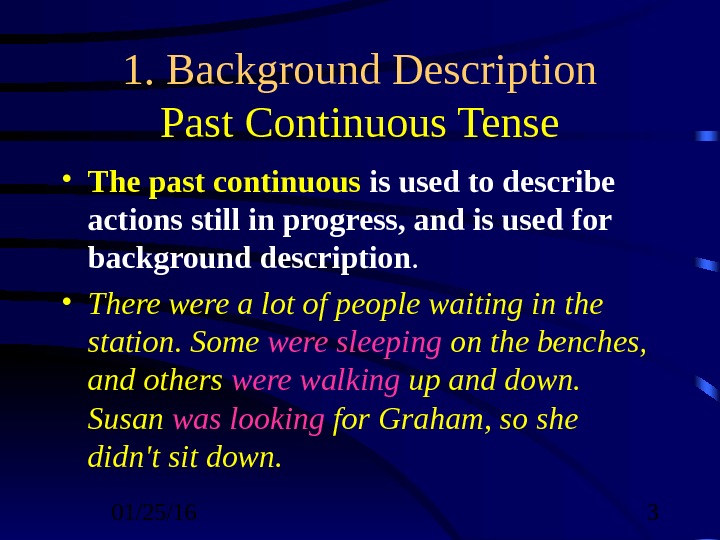
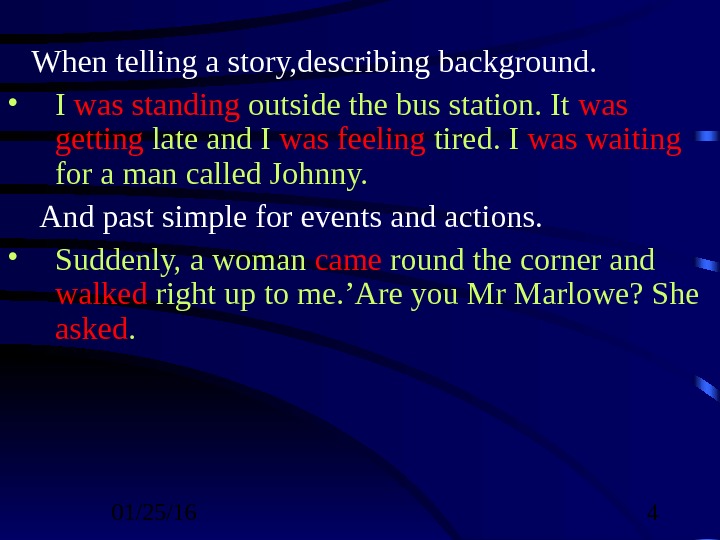
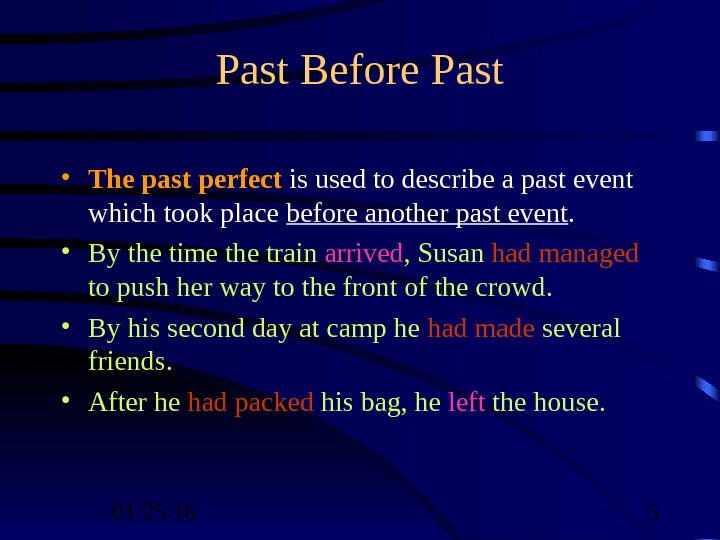
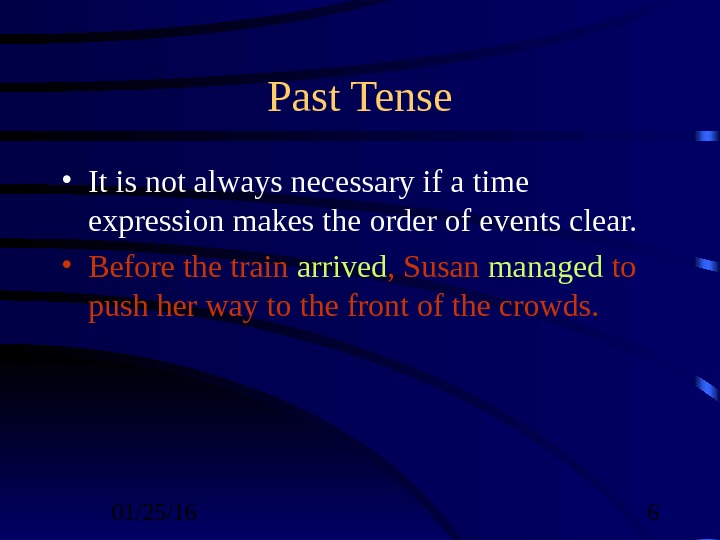
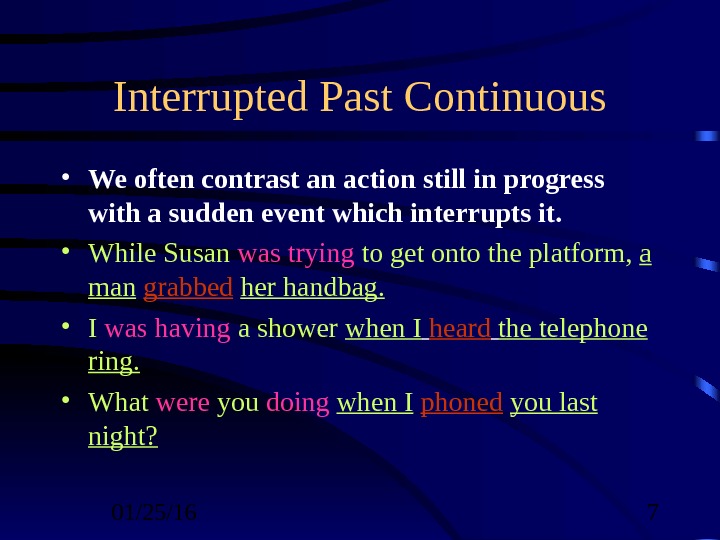
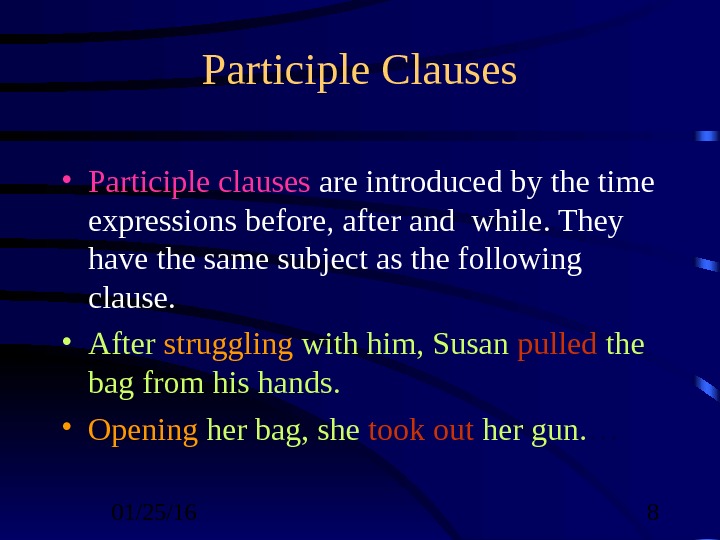
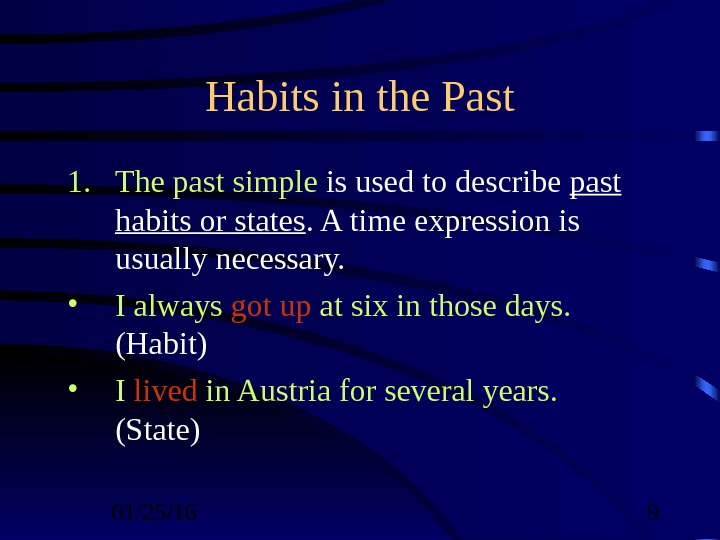
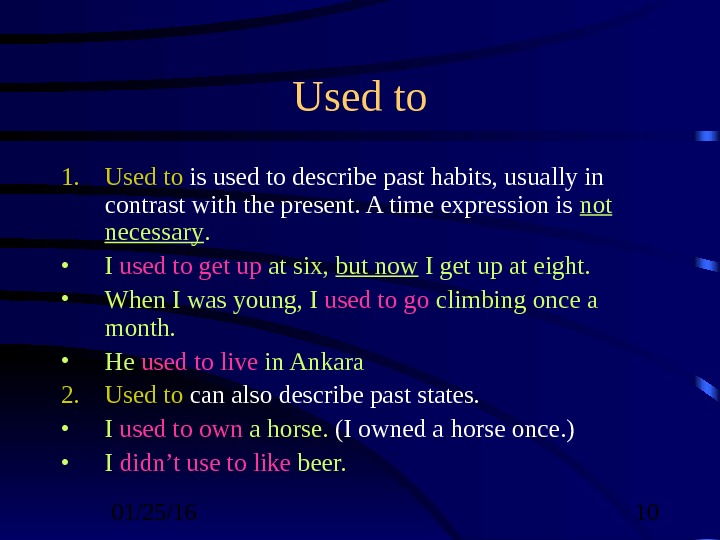
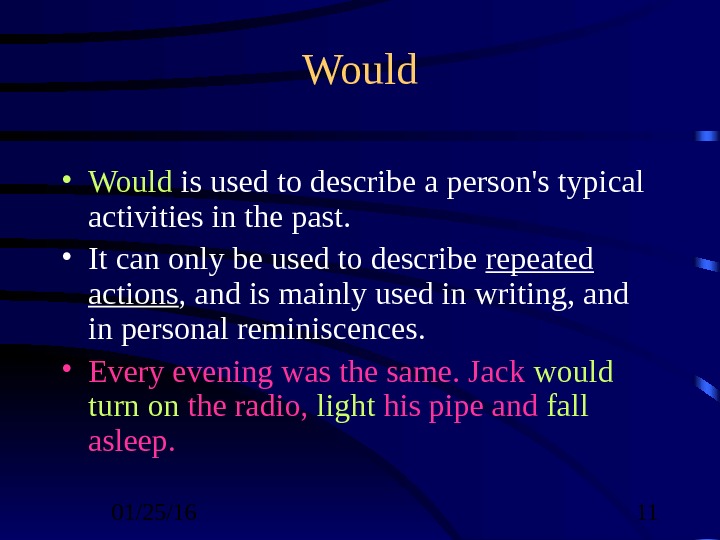
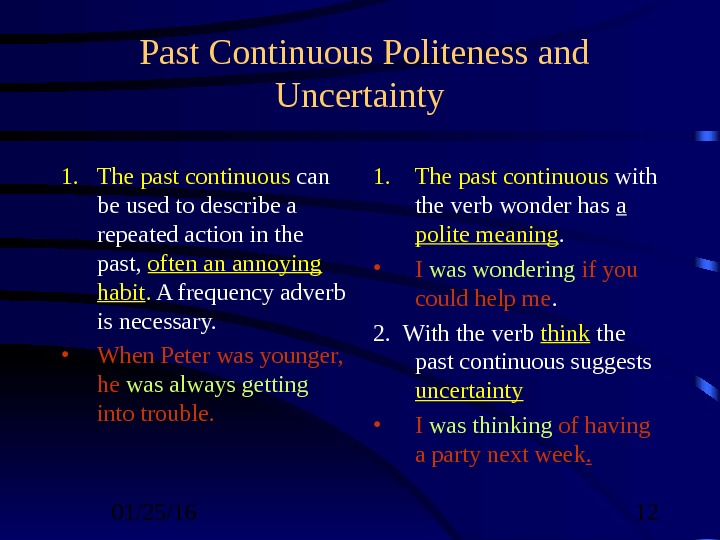
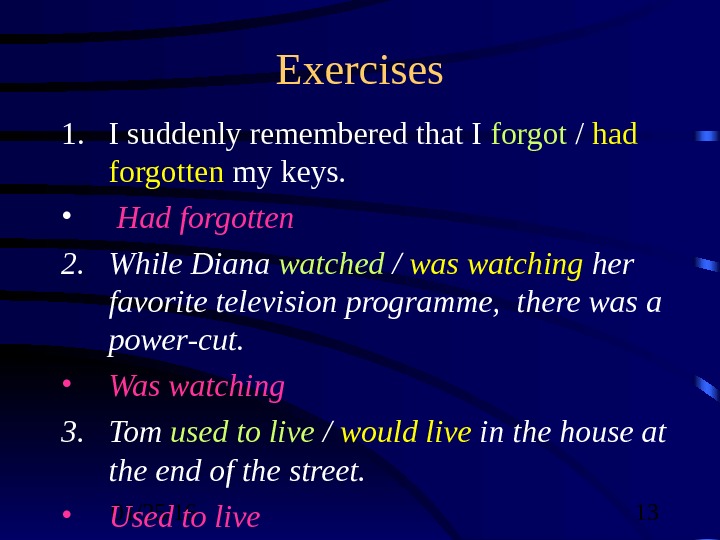
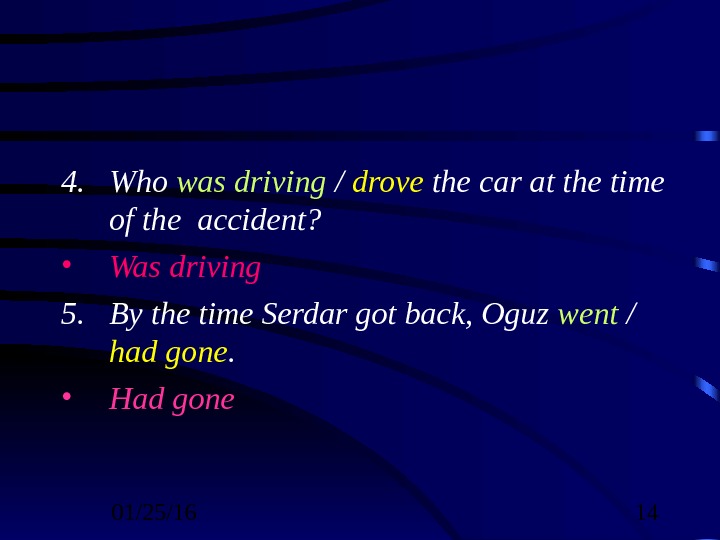
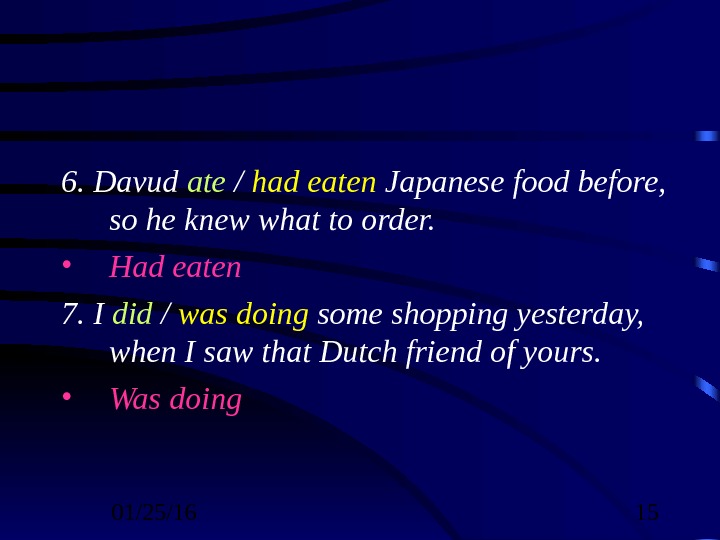
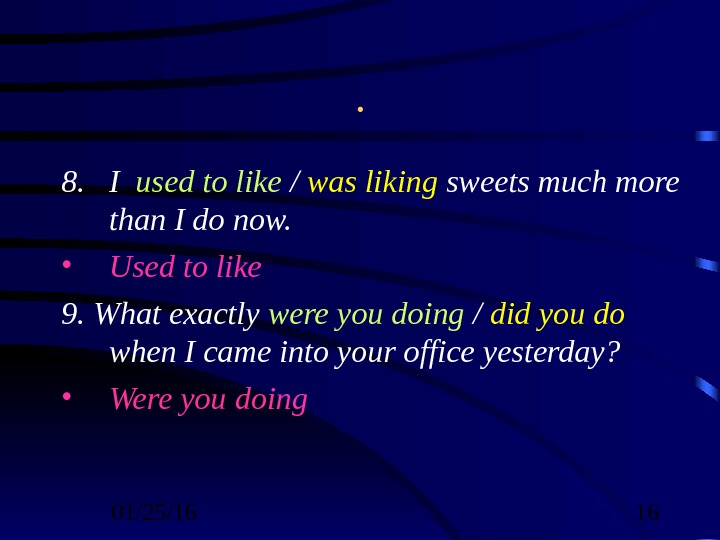
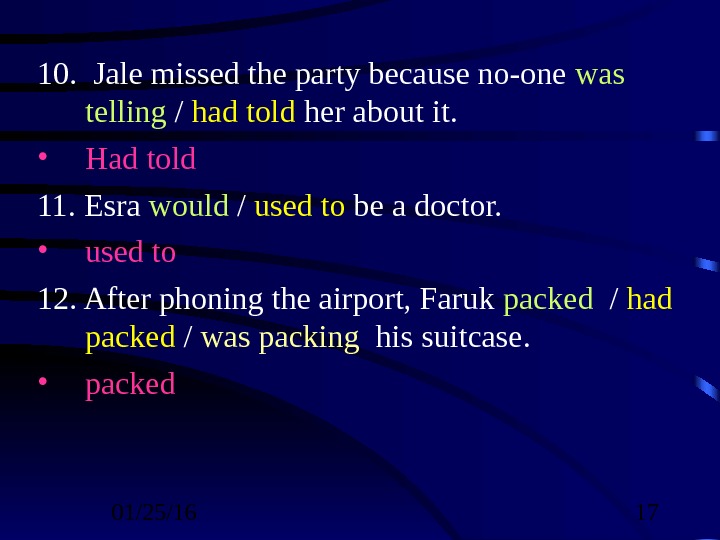
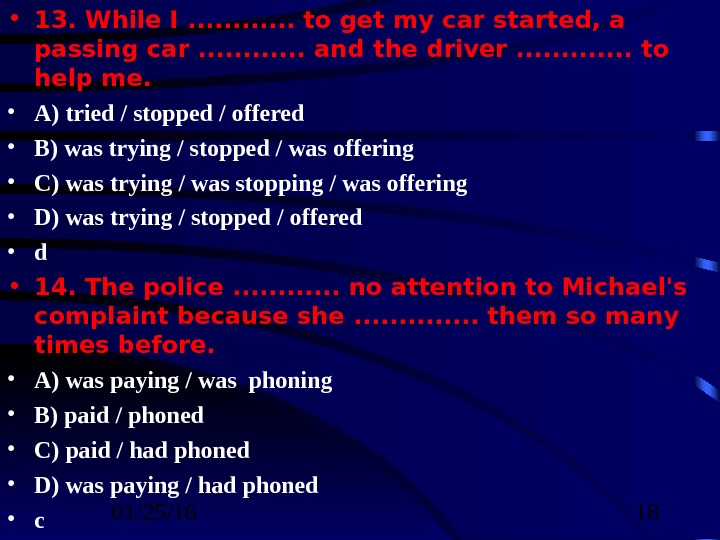
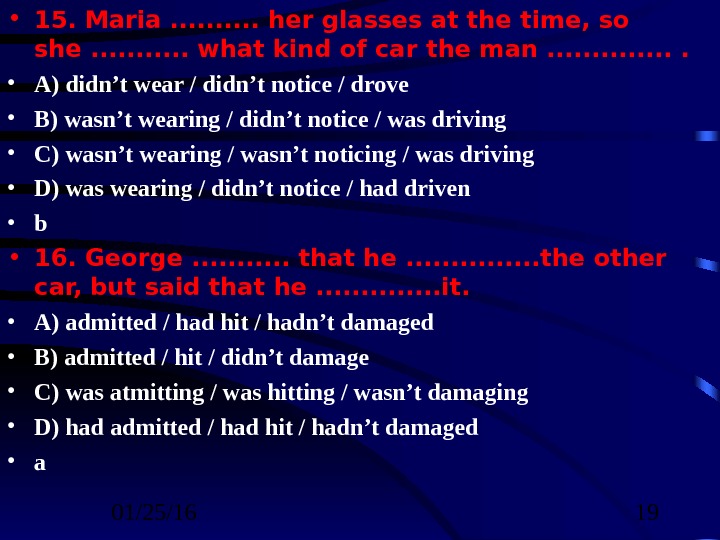
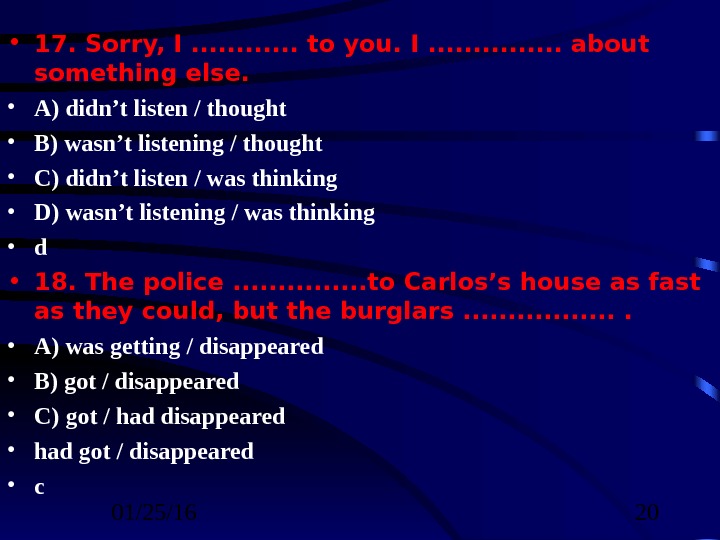
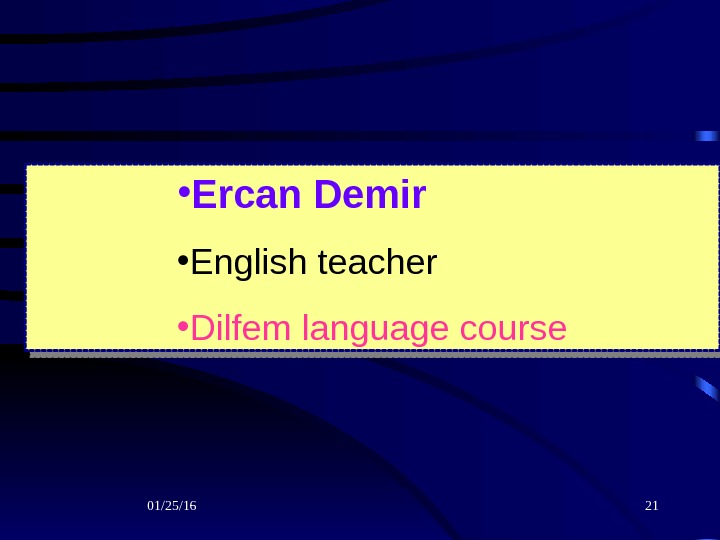
- Размер: 186.5 Кб
- Количество слайдов: 21
Описание презентации Презентация past tenses по слайдам
 01/25/16 1 Past Time • Main events • The past simple is used to describe finished events in the past. • Susan went into the station and bought a ticket. • Ali cleaned all the shoes two hours ago. • We finished our homework and played tennis. • Did you fill in the form yesterday? ercan demir: English Teacher
01/25/16 1 Past Time • Main events • The past simple is used to describe finished events in the past. • Susan went into the station and bought a ticket. • Ali cleaned all the shoes two hours ago. • We finished our homework and played tennis. • Did you fill in the form yesterday? ercan demir: English Teacher
 01/25/16 2 • We can use the past simple, to say that one thing happened after another. • When the telephone rang , Ali answered it. • I sheltered under the oak tree when it started to rain. • When Ayse arrived , Osman made some coffee. • I got up late yesterday morning and had a shower and then had breakfast. At 8 I left the house for school.
01/25/16 2 • We can use the past simple, to say that one thing happened after another. • When the telephone rang , Ali answered it. • I sheltered under the oak tree when it started to rain. • When Ayse arrived , Osman made some coffee. • I got up late yesterday morning and had a shower and then had breakfast. At 8 I left the house for school.
 01/25/16 31. Background Description Past Continuous Tense • The past continuous is used to describe actions still in progress, and is used for background description. • There were a lot of people waiting in the station. Some were sleeping on the benches, and others were walking up and down. Susan was looking for Graham, so she didn’t sit down.
01/25/16 31. Background Description Past Continuous Tense • The past continuous is used to describe actions still in progress, and is used for background description. • There were a lot of people waiting in the station. Some were sleeping on the benches, and others were walking up and down. Susan was looking for Graham, so she didn’t sit down.
 01/25/16 4 When telling a story, describing background. • I was standing outside the bus station. It was getting late and I was feeling tired. I was waiting for a man called Johnny. And past simple for events and actions. • Suddenly, a woman came round the corner and walked right up to me. ’Are you Mr Marlowe? She asked.
01/25/16 4 When telling a story, describing background. • I was standing outside the bus station. It was getting late and I was feeling tired. I was waiting for a man called Johnny. And past simple for events and actions. • Suddenly, a woman came round the corner and walked right up to me. ’Are you Mr Marlowe? She asked.
 01/25/16 5 Past Before Past • The past perfect is used to describe a past event which took place before another past event. • By the time the train arrived , Susan had managed to push her way to the front of the crowd. • By his second day at camp he had made several friends. • After he had packed his bag, he left the house.
01/25/16 5 Past Before Past • The past perfect is used to describe a past event which took place before another past event. • By the time the train arrived , Susan had managed to push her way to the front of the crowd. • By his second day at camp he had made several friends. • After he had packed his bag, he left the house.
 01/25/16 6 Past Tense • It is not always necessary if a time expression makes the order of events clear. • Before the train arrived , Susan managed to push her way to the front of the crowds.
01/25/16 6 Past Tense • It is not always necessary if a time expression makes the order of events clear. • Before the train arrived , Susan managed to push her way to the front of the crowds.
 01/25/16 7 Interrupted Past Continuous • We often contrast an action still in progress with a sudden event which interrupts it. • While Susan was trying to get onto the platform, a man grabbed her handbag. • I was having a shower when I heard the telephone ring. • What were you doing when I phoned you last night?
01/25/16 7 Interrupted Past Continuous • We often contrast an action still in progress with a sudden event which interrupts it. • While Susan was trying to get onto the platform, a man grabbed her handbag. • I was having a shower when I heard the telephone ring. • What were you doing when I phoned you last night?
 01/25/16 8 Participle Clauses • Participle clauses are introduced by the time expressions before, after and while. They have the same subject as the following clause. • After struggling with him, Susan pulled the bag from his hands. • Opening her bag, she took out her gun. …
01/25/16 8 Participle Clauses • Participle clauses are introduced by the time expressions before, after and while. They have the same subject as the following clause. • After struggling with him, Susan pulled the bag from his hands. • Opening her bag, she took out her gun. …
 01/25/16 9 Habits in the Past 1. The past simple is used to describe past habits or states. A time expression is usually necessary. • I always got up at six in those days. (Habit) • I lived in Austria for several years. (State)
01/25/16 9 Habits in the Past 1. The past simple is used to describe past habits or states. A time expression is usually necessary. • I always got up at six in those days. (Habit) • I lived in Austria for several years. (State)
 01/25/16 10 Used to 1. Used to is used to describe past habits, usually in contrast with the present. A time expression is not necessary. • I used to get up at six, but now I get up at eight. • When I was young, I used to go climbing once a month. • He used to live in Ankara. 2. Used to can also describe past states. • I used to own a horse. (I owned a horse once. ) • I didn’t use to like beer.
01/25/16 10 Used to 1. Used to is used to describe past habits, usually in contrast with the present. A time expression is not necessary. • I used to get up at six, but now I get up at eight. • When I was young, I used to go climbing once a month. • He used to live in Ankara. 2. Used to can also describe past states. • I used to own a horse. (I owned a horse once. ) • I didn’t use to like beer.
 01/25/16 11 Would • Would is used to describe a person’s typical activities in the past. • It can only be used to describe repeated actions , and is mainly used in writing, and in personal reminiscences. • Every evening was the same. Jack would turn on the radio, light his pipe and fall asleep.
01/25/16 11 Would • Would is used to describe a person’s typical activities in the past. • It can only be used to describe repeated actions , and is mainly used in writing, and in personal reminiscences. • Every evening was the same. Jack would turn on the radio, light his pipe and fall asleep.
 01/25/16 12 Past Continuous Politeness and Uncertainty 1. The past continuous can be used to describe a repeated action in the past, often an annoying habit. A frequency adverb is necessary. • When Peter was younger, he was always getting into trouble. 1. The past continuous with the verb wonder has a polite meaning. • I was wondering if you could help me. 2. With the verb think the past continuous suggests uncertainty • I was thinking of having a party next week.
01/25/16 12 Past Continuous Politeness and Uncertainty 1. The past continuous can be used to describe a repeated action in the past, often an annoying habit. A frequency adverb is necessary. • When Peter was younger, he was always getting into trouble. 1. The past continuous with the verb wonder has a polite meaning. • I was wondering if you could help me. 2. With the verb think the past continuous suggests uncertainty • I was thinking of having a party next week.
 01/25/16 13 Exercises 1. I suddenly remembered that I forgot / had forgotten my keys. • Had forgotten 2. While Diana watched / was watching her favorite television programme, there was a power-cut. • Was watching 3. Tom used to live / would live in the house at the end of the street. • Used to live
01/25/16 13 Exercises 1. I suddenly remembered that I forgot / had forgotten my keys. • Had forgotten 2. While Diana watched / was watching her favorite television programme, there was a power-cut. • Was watching 3. Tom used to live / would live in the house at the end of the street. • Used to live
 01/25/16 144. Who was driving / drove the car at the time of the accident? • Was driving 5. By the time Serdar got back, Oguz went / had gone. • Had gone
01/25/16 144. Who was driving / drove the car at the time of the accident? • Was driving 5. By the time Serdar got back, Oguz went / had gone. • Had gone
 01/25/16 156. Davud ate / had eaten Japanese food before, so he knew what to order. • Had eaten 7. I did / was doing some shopping yesterday, when I saw that Dutch friend of yours. • Was doing
01/25/16 156. Davud ate / had eaten Japanese food before, so he knew what to order. • Had eaten 7. I did / was doing some shopping yesterday, when I saw that Dutch friend of yours. • Was doing
 01/25/16 16. 8. I used to like / was liking sweets much more than I do now. • Used to like 9. What exactly were you doing / did you do when I came into your office yesterday? • Were you doing
01/25/16 16. 8. I used to like / was liking sweets much more than I do now. • Used to like 9. What exactly were you doing / did you do when I came into your office yesterday? • Were you doing
 01/25/16 1710. Jale missed the party because no-one was telling / had told her about it. • Had told 11. Esra would / used to be a doctor. • used to 12. After phoning the airport, Faruk packed / had packed / was packing his suitcase. • packed
01/25/16 1710. Jale missed the party because no-one was telling / had told her about it. • Had told 11. Esra would / used to be a doctor. • used to 12. After phoning the airport, Faruk packed / had packed / was packing his suitcase. • packed
 01/25/16 18 • 13. While I. . . to get my car started, a passing car. . . and the driver. . . to help me. • A) tried / stopped / offered • B) was trying / stopped / was offering • C) was trying / was stopping / was offering • D) was trying / stopped / offered • 14. The police. . . no attention to Michael’s complaint because she. . . them so many times before. • A) was paying / was phoning • B) paid / phoned • C) paid / had phoned • D) was paying / had phoned • c
01/25/16 18 • 13. While I. . . to get my car started, a passing car. . . and the driver. . . to help me. • A) tried / stopped / offered • B) was trying / stopped / was offering • C) was trying / was stopping / was offering • D) was trying / stopped / offered • 14. The police. . . no attention to Michael’s complaint because she. . . them so many times before. • A) was paying / was phoning • B) paid / phoned • C) paid / had phoned • D) was paying / had phoned • c
 01/25/16 19 • 15. Maria. . her glasses at the time, so she. . . what kind of car the man. . . . • A) didn’t wear / didn’t notice / drove • B) wasn’t wearing / didn’t notice / was driving • C) wasn’t wearing / wasn’t noticing / was driving • D) was wearing / didn’t notice / had driven • b • 16. George. . . that he. . . . the other car, but said that he. . . it. • A) admitted / had hit / hadn’t damaged • B) admitted / hit / didn’t damage • C) was atmitting / was hitting / wasn’t damaging • D) had admitted / had hit / hadn’t damaged • a
01/25/16 19 • 15. Maria. . her glasses at the time, so she. . . what kind of car the man. . . . • A) didn’t wear / didn’t notice / drove • B) wasn’t wearing / didn’t notice / was driving • C) wasn’t wearing / wasn’t noticing / was driving • D) was wearing / didn’t notice / had driven • b • 16. George. . . that he. . . . the other car, but said that he. . . it. • A) admitted / had hit / hadn’t damaged • B) admitted / hit / didn’t damage • C) was atmitting / was hitting / wasn’t damaging • D) had admitted / had hit / hadn’t damaged • a
 01/25/16 20 • 17. Sorry, I. . . to you. I. . . . about something else. • A) didn’t listen / thought • B) wasn’t listening / thought • C) didn’t listen / was thinking • D) wasn’t listening / was thinking • d • 18. The police. . . . to Carlos’s house as fast as they could, but the burglars. . . . • A) was getting / disappeared • B) got / disappeared • C) got / had disappeared • had got / disappeared • c
01/25/16 20 • 17. Sorry, I. . . to you. I. . . . about something else. • A) didn’t listen / thought • B) wasn’t listening / thought • C) didn’t listen / was thinking • D) wasn’t listening / was thinking • d • 18. The police. . . . to Carlos’s house as fast as they could, but the burglars. . . . • A) was getting / disappeared • B) got / disappeared • C) got / had disappeared • had got / disappeared • c
 01/25/16 21 • Ercan Demir • English teacher • Dilfem language course
01/25/16 21 • Ercan Demir • English teacher • Dilfem language course

